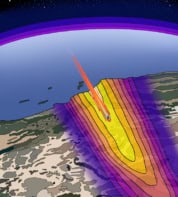
I just sat in on a press conference about how physicists are contributing to the study of climate change.
As a physicist writing for a physics publication, I often find it very difficult to cover stories about physicists tackling problems outside of “mainstream” physics. The problem is that I usually don’t know enough about the other discipline — be it botany, climatology or whatever — to really know if what the physicist has done is relevant.
One way to find out is to call up a botanist (say) and ask them. But it’s often the case that they are completely unaware that physicists are working in their field, and they speak a completely different language so it can be difficult to understand their take on the work.
Extreme rainfall events can be correlated over thousands of kilometres, study reveals
Climate change offers rich seams of data and complex systems for physicists to study, and I’m guessing that research funds are not hard to come by. But despite the endless calls for more interdisciplinary collaboration, I fear that many physicists are tempted to look at climate change from a purely physics perspective — and miss the chance to make a more significant contribution.
I raised my concerns with the panel and John Wettlaufer of Yale University said that it was very important for physicists working outside the mainstream “to have a genuine interest in learning about someone else’s problem”. However, he admitted that “not many people want to do this”.
Brad Marston of Brown University added that it was important that physicists try to publish their work in general-interest journals such as the Proceedings of the National Academies of Science, where they will be peer reviewed (and hopefully read) by non-physicists.




